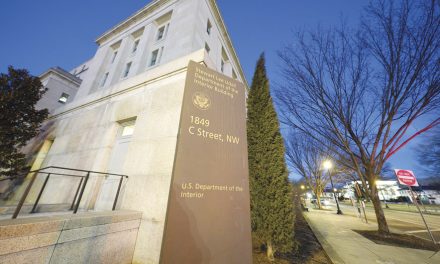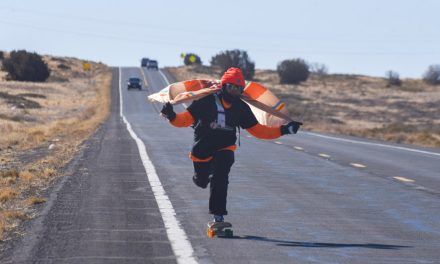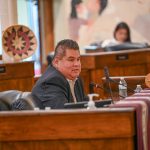
Capital Briefs | Biden signs National Vietnam War Veterans Day proclamation
WASHINGTON
On Monday, President Joe Biden signed a proclamation that commemorates the 50th anniversary of the Vietnam War.
“On National Vietnam War Veterans Day,” the proclamation says, “we honor all those who bravely served in the Vietnam War and who sacrificed, as did their families and caregivers, on behalf of our Nation.”
Throughout the years of Vietnam, 9 million Americans earned the title of U.S. veteran, the proclamation says, adding, “We will always remember those we lost and those who came home.”
In 2012, President Barack Obama launched a 13-year commemoration of the 50th anniversary of Vietnam.
Biden said, “To the families of over 1,500 service members who remain missing and unaccounted for, know that our Nation’s efforts to bring them home will never stop.”
Biden affirmed the commemoration of the 50th anniversary of the Vietnam War, which will continue through Veterans Day on Nov. 11, 2025.
Navajo flags at half-staff for Vietnam veterans

Navajo Times | Krista Allen
Names of Diné men and women who served in the military are affixed to a board that would be displayed in the new Tonalea Chapter House.
WINDOW ROCK – On Tuesday, the Navajo Nation also issued a proclamation recognizing Vietnam Veterans Day in honor of the the sacrifices of all who served. All flags on the Navajo Nation were flown at half-staff.
Also in Washington, President Jonathan Nez and Navajo Veterans Administration Director James Zwierlein met with Congressional leaders to advocate for a veterans’ benefits outreach center and a veterans’ clinic to provide services for Navajo veterans closer to home.
Zwierlein, who serves on the VA Advisory Committee on Tribal and Indian Affairs, is working closely with other entities, including Navajo Housing Authority, to leverage additional funds.
Zwierlein said, “It’s been a journey, but with the extremely positive conversations today and those anticipated for tomorrow, that journey is nearing a fruitful conclusion.”
The population of veterans on the Navajo Nation is more than 10,000.
IRS: COVID relief payments not taxable
WASHINGTON – The IRS on Tuesday issued answers to frequently asked questions, including whether COVID relief payments issued by tribes to tribal members for costs incurred because of the pandemic are taxable.
The IRS suggested that the payment you received from your tribe for reasonable and necessary personal, living, family, or funeral expenses is not included in your gross income and is not taxable.
The IRS said tribal members do not need to report the payments as income on their federal income tax returns.
These answers cover payments Navajo Nation citizens received from the CARES Act, enacted on March 27, 2020, the Consolidated Appropriations Act, passed on Dec. 27, 2020, and the American Rescue Plan Act, enacted on March 11, 2021.
‘Uncontrolled spread’ warning issued to 7 chapters
WINDOW ROCK – Based on the number of COVID-19 cases from March 11-24, the Navajo Department of Health issued a health advisory notice warning of the “uncontrolled spread” of the coronavirus to 7 of the 110 chapters.
These chapters include Coyote Canyon, Ganado, Indian Wells, Naschitti, Newcomb, Pinon, and Ramah.
Bill would ensure IHS access to National Medical Emergency Stockpile
WASHINGTON – The Tribal Medical Supplies Stockpile Access Act, co-sponsored by Sen. Kyrsten Sinema, D-Ariz., would guarantee that the Indian Health Service, tribal health authorities, and urban Indian organizations have access to the Strategic National Stockpile.
A federal repository of drugs and medical supplies that can be tapped if a public health emergency exhausts local supplies, the stockpile was used during the height of the coronavirus pandemic, helping save lives and support local communities.
IHS and tribal health authorities’ access to the stockpile is limited and not guaranteed. However, states and large municipalities have direct access to the stockpile, and making tribes go through states has proven inefficient.
The bill is supported by the Tohono O’odham Nation, Colorado River Indian Tribes, Salt River Pima County Indian Community, Navajo Nation, Gila River Indian Community, Pascua Yaqui Tribe, National Congress of American Indians, National Indian Health Board, and National Council of Urban Indian Health.
Ned Norris Jr., chairman of the Tohono O’odham Nation, said, “Tribal nations should not have to jump through bureaucratic hoops to access vital medical supplies, particularly during a public health crisis.
“This legislation will ensure that tribal health-care providers can directly receive supplies from federal stockpiles of N95 masks, vaccines, and other items,” he said.
Tribes meet with Haaland on Colorado River concerns
ALBUQUERQUE – On Monday, a group of tribal leaders met with U.S. Secretary of the Interior Deb Haaland. They advocated for meaningful involvement in the long-term management of the Colorado River Basin.
The group discussed the ongoing challenges of historic drought and low-runoff conditions.
The historically low water levels at Lake Powell and Lake Mead in the Colorado River Basin were mentioned. They also discussed opportunities to work together on current challenges and other tribal priorities regarding water management in the basin.
Haaland emphasized how critical tribal involvement will be in the upcoming efforts to develop post-2026 operational rules for the operation of Lake Powell and Lake Mead.
On Nov. 15, 2021, the Navajo Nation and 19 other tribes issued a letter requesting a meeting with Haaland to discuss Colorado River Basin matters.
President Jonathan Nez said 30% to 40% of the Navajo people do not have running water.
“It’s important for the Department of the Interior to hear the Nation’s concerns and commit to providing universal access to clean water as a component of fulfilling its federal trust responsibility to the Navajo Nation and tribes,” Nez said.
At Monday’s listening session, Haaland committed to additional government-to-government consultation and designated Tanya Trujillo, Department of the Interior assistant secretary for water and science, to serve as the point of contact.
The Colorado River is managed and operated under the 1922 Colorado River Compact and federal laws, court decisions and decrees, contracts, and regulatory guidelines collectively known as the “Law of the River.”
Historically, tribes in the basin have not been able to engage in the federal and state process.
The Navajo Nation’s land base straddles the Upper and Lower Colorado River basins. The Navajo Nation continues to negotiate its water rights in Arizona.
Indian affairs to consult with tribes on fee-to-trust, gaming regs
WASHINGTON – The Department of the Interior’s Office of the Assistant Secretary for Indian Affairs Tuesday announced that it will hold consultations with tribes on amendments to two different regulations, one regarding the fee-to-trust process and another regarding Class III gaming compacts.
The proposals aim to address concerns about their clarity, efficiency, and cost.
With the taking of land into trust on behalf of tribes, changes under consideration would lead to a more efficient, less cumbersome, and less expensive process by clarifying the secretary’s authority, reduce processing time, and establish clear decision-making criteria.
With gaming, changes under consideration would provide clarity on criteria the department would consider when deciding whether to approve compacts, define key terms and outline when the department must review a gaming compact.
Four virtual consultation sessions will be conducted between May 9 and May 23. The department is holding consultations on these changes at the same time to maximize convenience for tribal leaders. Oral and written comments will be accepted.
Information: www.indianaffairs.gov








 Highway 264,
Highway 264, I-40, WB @ Winslow
I-40, WB @ Winslow